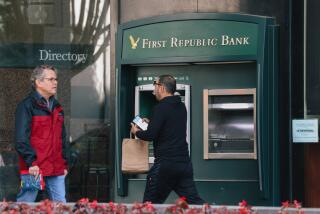Citicorp Enters Bidding to Buy Troubled FCA
- Share via
Citicorp, the nation’s biggest commercial banking firm, is interested in buying at least a part of Financial Corp. of America, the troubled savings and loan firm that owns the nation’s largest S&L;, it was disclosed Friday.
The revelation confirmed reports Thursday that a second company had entered the bidding for Irvine-based FCA, rivaling a $1-billion offer already on the table from First Nationwide Bank.
First Nationwide, based in San Francisco, is owned by Ford Motor Co. FCA’s operating subsidiary is Stockton-based American Savings & Loan.
Citicorp’s interest was confirmed by a spokesman for the Federal Home Loan Bank Board, the primary regulatory agency for savings and loan firms, but he declined to provide further details.
According to some reports, New York-based Citicorp is primarily interested in buying American Savings’ branch network in California but not the large portfolio of mortgage-backed securities and problem-ridden real estate loans. FCA has more than $33 billion in assets and about 180 branch offices throughout California.
Negotiating for Months
“The chief asset at FCA is clearly its branch system,” noted Jonathan Gray, financial analyst for Sanford C. Bernstein & Co. in New York.
First Nationwide is offering to buy the entire company. “We’re offering a comprehensive, permanent solution” to FCA’s problems, said Anthony Frank, chairman of First Nationwide.
The Federal Home Loan Bank Board has been orchestrating the attempts to find new funds for American Savings, which needs more than $900 million in new capital to comply with federal regulatory requirements. (Citicorp Savings, an Oakland-based subsidiary of the giant New York bank, had regulatory capital of $937 million on June 30, according to Sheshunoff Rating Services in Austin, Tex.)
The Bank Board and the Federal Savings & Loan Insurance Corp., an arm of the Bank Board, have been negotiating with Ford and First Nationwide for months over ways to structure a sale. Regulators say their most important consideration is minimizing the cost to FSLIC, which steps in when a savings and loan becomes insolvent.
Though details remain incomplete, a deal with Citicorp could lead to a breakup of FCA into several parts, according to one source close to the negotiations. These parts could include a “clean” savings and loan with healthy loans and most of the branches; another S&L; with only a few branches whose most valuable asset would be FCA’s tax credits, valued at $800 million to $1 billion; a third element comprised of mortgage-backed securities and problem loans that would be managed by American Savings’ real estate sales group.
Citicorp apparently has not yet stated how much money it is willing to invest. “There are no numbers on the table,” according to one participant. “There are just discussions on what the problems will be.”
A spokeswoman for Citicorp declined to comment, saying, “It’s a corporate policy never to discuss matters like this.”
It was learned, though, that FCA Chairman William J. Popejoy met this week in Washington with executives of Citicorp, including Seymour Flug, who is in charge of mergers and acquisitions for Citicorp’s consumer banking operations. Flug could not be reached and Popejoy would not comment, other than to say, “If anything happens of substance, we will refer that to the Bank Board.”
Ironically, the stock market crash has enhanced the value of American Savings, which has a portfolio of mortgage-backed securities worth between $17 billion and $18 billion. The break in interest rates that followed last month’s crash has driven up the market value of FCA’s mortgage securities portfolio by more than $1 billion. (As interest rates drop, these securities rise in value.)
If Citicorp does eventually buy some part of FCA, it will presumably merge the operations into Citicorp Savings, which was formed in 1982 when Citicorp acquired the insolvent Fidelity Savings.
After several years of maintaining a very low profile and while conducting extensive internal reorganizations, Citicorp Savings emerged from its cocoon this year, growing rapidly and buying branch offices throughout the state.
Its assets of $6.9 billion are 47% higher than year-ago levels and it recently acquired 50 branch offices and $2 billion in deposits from Sears Savings Bank. The deal, valued at more than $120 million, gave Citicorp Savings a major presence in Southern California for the first time.
Citicorp is one of several financial institutions and private investors--including Great Western Bank in Beverly Hills and former Treasury Secretary William E. Simon--that had expressed preliminary interest in FCA but later dropped out.
Banking industry sources say Citicorp is showing a renewed interest in FCA that is related to Paul A. Volcker’s decision in June to leave his post as chairman of the Federal Reserve Board. Citicorp and Volcker had disagreed at times over banking policy, they said.
The Volcker-run Federal Reserve also discouraged commercial banks from entering the bidding for the big S&L; firm because FCA has $1 billion in intangible, non-earning assets known as good will. These assets are reflected in the balance sheet when one savings and loan buys another at above the market value.
FCA assumed its good will four years ago when it bought another savings and loan company in Los Angeles known as First Charter. The problem, according to banking industry sources, is that a commercial bank--which has more stringent capital standards than a savings and loan--that buys FCA would be required to write off this good will against its capital.
Now, however, the Federal Reserve under new Chairman Alan S. Greenspan may be willing to grant some kind of “forbearance” on the good-will writeoff issue in order to make FCA more attractive, one banking source said.
More to Read
Inside the business of entertainment
The Wide Shot brings you news, analysis and insights on everything from streaming wars to production — and what it all means for the future.
You may occasionally receive promotional content from the Los Angeles Times.









